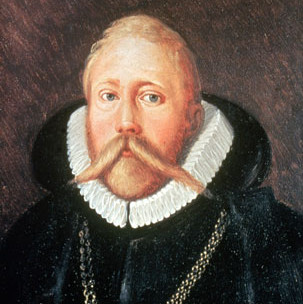What's With the Name?

Tycho Brahe was a 16th century Danish astronomer who cared about data. He had a gold nose (though not in his portrait) and an epic mustache (shown in portrait). Tycho was obsessed with tracking the motion of celestial objects, and he kept meticulous records of his observations.
Tycho leveraged his data to make breakthrough discoveries about supernovae and comets, but, despite his scientific successes, Tycho's eyes were always set on a grander discovery. Tycho strived to decipher the laws governing our solar system.
While Tycho struggled to uncover the laws governing our solar system, Johannes Kepler came to apprentice for Tycho. And, to make a long story short, Kepler eventually used Tycho's excellent data to decode what are now called Kepler's laws of planetary motion.
Before getting access to Tycho's data, Kepler searched for years to uncover the laws of planetary motion. Kepler only made his historic discovery after accessing Tycho's data. Kepler gets all the glory in the history books, but it was Tycho's data that gave Kepler the context to construct the laws and the evidence to support his findings.
Tycho's work to gather data and test hypotheses against empirical data changed the world. Tycho did not decode the laws governing the solar system, but his work and data allowed for Kepler to make his great breakthrough. The lesson we take from Tycho Brahe is that data is the key. Track your data and you can throw ideas at it in the future. You can create models and test them against the data. As the data continues to flow in, you can continuously test and improve your models.